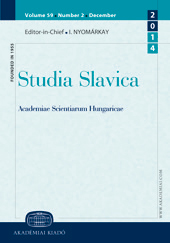Souvenir – avenir - Die Mehrsprachigkeit des Romans von A. Kuśniewicz Lektion in einer toten Sprache
Souvenir - avenir The multilingualism of the novel by A. Kuśniewicz The Hour of a dead language
Author(s): István FriedSubject(s): Polish Literature, Theory of Literature
Published by: Akadémiai Kiadó
Keywords: Kuśniewicz; decadence; Austro-Hungarian Monarchy; World War I; fragment;
Summary/Abstract: This study deals with the work The Hour of a Dead Language, a novel of an important figure of modern Polish literature, A. Kuśniewicz. The story is set on the periphery of the Austro-Hungarian Monarchy in the last year of World War I. The protagonist, Kiekeritz, who suffers from a lung disease, collects the fragmented object memories of the past in the hope of reconstructing it by building up a coherent story after returning home. The plot signifies the intertwining of microhistory and macrohistory. The death of the officer and the dissolution of the Monarchy run on parallel courses: the past cannot be brought to the present, it remains fragmental. After having looked for the language of the present in vain, the officer realises the universal decay. The language of the officer and that of the Monarchy parish, which is also shown by the allegory of nature, are perceived in the novel.
Journal: Studia Slavica Academiae Scientiarum Hungaricae
- Issue Year: 59/2014
- Issue No: 1
- Page Range: 15-25
- Page Count: 11
- Language: German
- Content File-PDF

